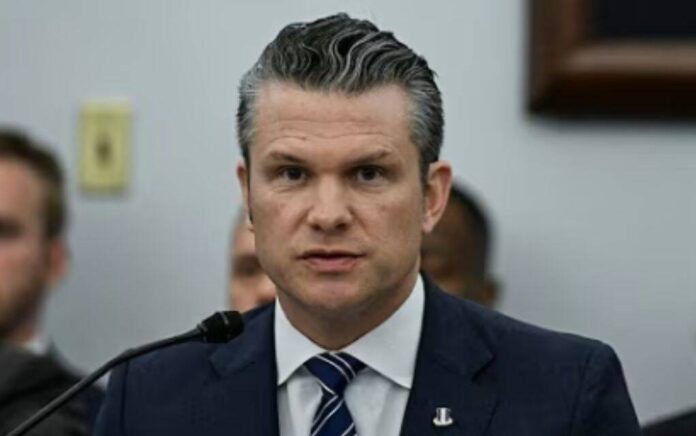
Hegseth is a non-sense leader. He proves that daily.
And Pete Hegseth laid the hammer down on the Leftist media with one move.
In a move that’s got the mainstream media squawking, War Secretary Pete Hegseth showed several outlets the door on Monday. These so-called journalists balked at signing the Pentagon’s updated press policy, claiming it stomps all over the First Amendment. But Hegseth fired back, insisting this just brings the Pentagon up to speed with the same commonsense rules that apply at every other U.S. military base.
The policy dropped in a memo back in late May, laying out clear expectations for anyone wanting to poke around the halls of power. It boils down to this: “All members of the press issued a Pentagon Facility Alternate Credential (PFAC), will be required to read and sign a new in–brief form outlining information security requirements, the new physical control measures, and Department of War expectations of their compliance with safety and security requirements.”
Plenty of big-name outlets aren’t having it, digging in their heels and declaring their reporters won’t put pen to paper on those forms. It’s a who’s who of the usual suspects, all crying foul over what they see as an attack on their sacred right to snoop unchecked.
Take the Washington Post, for instance. Their Executive Editor Matt Murray put out a fiery statement: “Journalists from The Washington Post will not be signing the Pentagon’s new press access policy. The proposed restrictions undercut First Amendment protections by placing unnecessary constraints on gathering and publishing information. We will continue to vigorously and fairly report on the policies and positions of the Pentagon and officials across the government.”
Hegseth didn’t mince words—or rather, he didn’t use any. He just hit back with a simple waving hand emoji, brushing off the Post like yesterday’s news.
— Pete Hegseth (@PeteHegseth) October 13, 2025
Not to be outdone, The Atlantic’s Editor in Chief Jeffrey Goldberg chimed in with his own defiance: “The Atlantic’s journalists will not sign the Pentagon’s press policy. We fundamentally oppose the restrictions that the Trump administration is imposing on journalists who are reporting on matters of defense and national security. The requirements violate our First Amendment rights, and the rights of Americans who seek to know how taxpayer-funded military resources and personnel are being deployed. We will [continue] to cover matters of defense, war, and national security independently and fairly.”
Once again, Hegseth waved them away with that same emoji, making it crystal clear he wasn’t buying their victim routine.
The New York Times jumped on the bandwagon too, with Washington Bureau Chief Richard Stevenson issuing this: “Journalists from The New York Times will not sign the Pentagon’s revised press pass policy, which threatens to punish them for ordinary news gathering protected by the First Amendment. Since the policy was first announced, we have expressed concerns that it constrains how journalists can report on the U.S. military, which is funded by nearly $1 trillion in taxpayer dollars annually. The public has a right to know how the government and the military are operating. The Times is dedicated to pursuing the public interest through deep, fair reporting and an unwavering pursuit of the facts.”
Hegseth wasn’t about to let that slide without a comeback. He laid it out plain and simple: “Pentagon access is a privilege, not a right. So, here is @DeptofWar press credentialing FOR DUMMIES: Press no longer roams free; Press must wear visible badge; Credentialed press no longer permitted to solicit criminal acts. DONE. Pentagon now has same rules as every U.S military installation.”
It’s not just the left-leaning rags throwing a fit—even some outlets that lean right are pushing back, echoing the same gripes about overreach and unnecessary burdens.
Newsmax, for one, put out their stance loud and clear: “Newsmax has no plans to sign the letter. We are working in conjunction with other media outlets to resolve the situation. We believe the requirements are unnecessary and onerous and hope that the Pentagon will review the matter further.”
The Wall Street Journal joined the chorus, along with the Washington Examiner, both voicing similar objections to what they call heavy-handed restrictions on their ability to cover the military.
CNN, that bastion of fake news, didn’t hesitate to pile on, refusing to sign and claiming the policy hampers real journalism.
The Associated Press and The Guardian rounded out the list of holdouts.
At the end of the day, Hegseth’s stance is a breath of fresh air for those tired of the media treating the Pentagon like their personal playground.
By enforcing these basic security measures, he’s putting America first, ensuring that sensitive operations aren’t compromised by rogue reporters chasing scandals.
Stay tuned to The Federalist Wire.



















